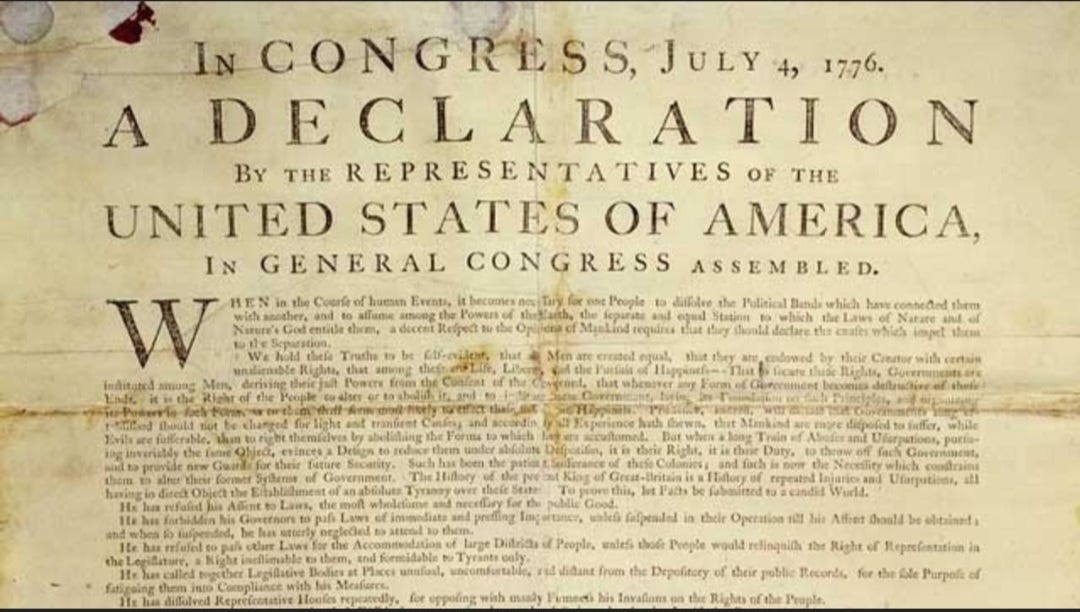..."Life, Liberty and Property"?
Some insight into the drafting of the Declaration of Independence
Growing up in the United States, attending American schools, and with a patriotic culture, the most famous portion of the Declaration of Independence has been ingrained in us:
"We hold these truths to be self-evident, that all men are created equal, that they are endowed by their Creator with certain unalienable Rights, that among these are Life, Liberty and the pursuit of Happiness."
These poetic ideals in the last part of this early section of this amazing, world-changing document was actually altered from its original version. "Pursuit of Happiness" was not in Jefferson's draft of the Declaration.
Let's take a step back. During the Second Continental Congress in 1776, blood had already been shed in the colonists' fight for independence. As some members of Congress worked to avoid war, there was a feeling that armed conflict to rid the colonies of British rule was inevitable. In preparation for the possibility of Congress officially cutting all ties from Great Britain, a committee was chosen to draft a declaration of independence. Of this group, we have 3 key players in American History: Benjamin Franklin, John Adams, and Thomas Jefferson. While Jefferson believed Adams was the best person to write the document, Adams was self aware enough to know that he was not popular with some members of Congress. He felt that Jefferson, as a skilled writer and a respected Virgian, would make a better main author of the original draft of the declaration. After some discussion along with Franklin and others, Jefferson agreed to write the document.
For approximately two weeks, Jefferson locked himself away in his apartment in Philadelphia just a few blocks from where the Continental Congress was meeting in the Pennsylvania State House. Today, call this building as Independence Hall.
Jefferson returned with the document and met with the Committee of Five as it came to be known to finalize it before presenting it to Congress. The Five included Franklin, Adams, Jefferson along with Roger Sherman and Robert Livingston. Jefferson believed that the document was perfect in its original form and was initially against any changes. But, he deferred to his colleagues, especially the elder statesman Franklin.
One of the most impactful changes was in the portion referred to previously. Jefferson's original draft about natural rights was "Life, Liberty and Property."
Jefferson was greatly influenced by philosophers of the Enlightenment including John Locke. Locke wrote about man having natural rights not given by man but by God and strongly believed in the idea that people had an absolute right to own property.
So, why does Franklin cross out "property" from this crucial part of the Declaration and replace it with "Pursuit of Happiness"?
Well, in most of the world at the time, especially Europe, land was not something that was easily obtained. In Great Britain, land was owned by the King, members of the nobility and a few other small groups.
For centuries, through times of feudalism and serfdom over 90% of the people didn't own land and had very little prospects of ever obtaining ownership of land in their lifetime. If you were born into a peasant household, it was understood that your life would be connected to working on other people's land or being a craftsmen of some type. The idea of owning land was a completely foreign concept. Only if you were born into royalty or nobility would you have the opportunity of being a land owner.
However, in the British Colonies in North America, land was plentiful.
When we, as younger students, studied early Eurpean exploration to the New World, a lot of the stories surrounded people's pursuit of religious freedom that drove them to the New World. We learned about the Pilgrims and their desire to escape religious persecution in England.
Certainly there were a large number of people who came to the American colonies in the 17th and 18th centuries to freely worship as they chose. But another pull factor that caused many English to make the perilous journey to the colonies was the idea of owning land. This was an opportunity that they would have never had a chance to experience if they stayed in the British Isles. So, Franklin, understanding that there was a vast amount of land available in North America chose to make the change, against Jefferson's objection, to "Pursuit of Happiness". And for many who would eventually own property, a great measure of happiness was in fact achieved.
After the United States won the American Revolution and created the US Constitution, Franklin is quoted as saying, "The Constitution only gives people the right to pursue happiness. You have to catch it yourself."




